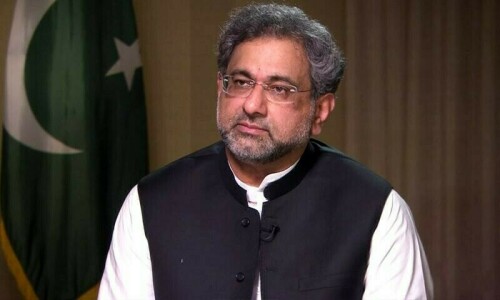PML-N’s Shahid Khaqan Abbasi on Monday doubled down on his corruption allegations pertaining to the free flour distribution programme, saying that his initial estimate of embezzled funds adding up to Rs20 billion was in fact undervalued.
He also reiterated that he held the “system” responsible for the alleged corruption and not any particular government.
Abbasi — who is part of a group of political mavericks holding a series of nationwide seminars on the current challenges being faced by the country — had alleged at a seminar at Lahore’s Government College University on Saturday that Rs20bn was looted during the free flour distribution programme, first rolled out in Punjab.
He had said: “Recently, Rs84bn worth of [free] flour was distributed. I am sorry to say that approximately Rs20bn was looted. Look at it any which way. What has the poor man gotten for whom you spent Rs84bn?”
Abbasi had said it was impossible to deliver on promises within the current system of governance and called for it to be “redefined”.
“The whole system needs to be changed. It has become so corrupt that it cannot deliver, whether in the Centre or the provinces.”
Although the PML-N leader had not singled out the Punjab government, provincial Interim Information Minister Amir Mir had issued a statement on Saturday and termed Abbasi’s allegations “false and fabricated”. Separately, the province’s food department had also denied any corruption.
Speaking in an interview today on Dawn News show ‘Live with Adil Shahzeb’ today, Abbasi reiterated that in his remarks, he meant to attribute the corruption to the “system”.
“I was talking about the governing system which has become so corrupt,” he added, clarifying that he was not talking about any government in particular.
Abbasi said the system had become so corrupt that even a “well-intentioned” initiative of the prime minister was not spared.
“There is more than 30 per cent corruption in the Punjab Food Department. This is not today’s but has been [present] since it (the department) was formed and has kept increasing since.”
Based on this observation, he said, he estimated that around 25pc of the funds allocated for the flour distribution programme would be looted.
“The PM sahib approved Rs84bn for it (the flour distribution programme), and I estimated that Rs20bn will be looted.
“And I am honestly telling you that the 25pc figure is undervalued,” he added.
Abbasi further said that elections were not a solution to this problem.
“It is not a matter of elections or who is in power or the government but the rot in the system,” he said.
Free flour scheme
In March, Prime Minister Shehbaz Sharif had announced that “the poorest of the poor” would get wheat flour (Atta) for free during Ramazan. The package was first implemented in Punjab and then in other parts of the country.
The prime minister had directed the authorities to chalk out a strategy for the supply of flour to poor families “as soon as possible”.
However, the programme was marred by violence and deaths as citizens thronged distribution points amid a significant increase in inflation in the country. Incidents of stampedes, chaos and snatching of flour bags at the distribution points were reported from various towns of the province.
Earlier this month, the Punjab caretaker government succumbed to the pressure of the federal authorities and approved the expansion of the project at an additional cost of Rs35bn.
The package was to initially cost around Rs53bn to the provincial kitty as the government was to release 537,000 tonnes of wheat from its stocks to the flour mills for grinding and providing the commodity at the distribution points. The operational cost – administration, security and transportation – of the project was estimated to be Rs7bn.
Sources said that neither the Punjab government nor bureaucracy was in favour of the scheme in its present form which was leading to deaths and injuries to the deserving people due to overcrowding and mismanagement at the distribution points.
Officials engaged in the flour distribution also blamed the Punjab Information Technology Board’s ‘flawed’ app developed on the database of the Benazir Income Support Programme (BISP) for the inordinate delays in the distribution of the commodity.
Sources said the provincial authorities made an abortive attempt to convince the premier in their March 7 meeting that deserving people should instead be paid in cash through the BISP database or provided subsidies in the powers bills for offsetting the impact of the historically high inflation.
They said the prime minister was also suggested that the subsidy on the flour which the Punjab government was already providing to the masses before setting in of Ramazan at a rate of Rs648 per 10kg bag, could be further increased to facilitate the downtrodden to avoid the mess likely to be caused by the free flour distribution at the makeshift points.
But, the premier rejected this option too and insisted on implementing the plan he desired to introduce.
















































